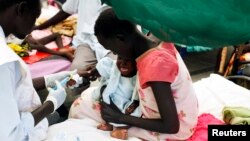A study released Wednesday says the conflict in South Sudan could cost the country tens of billions of dollars in lost economic opportunities unless peace is reached soon. The country's neighbors will also suffer lost trade and other costs, the longer the crisis drags on.
The report from Frontier Economics, a European consultant firm, estimates the conflict in South Sudan could cost the country up to $28 billion during the next five years.
But the effects of the war over time could result in losses of $158 billion during the next 20 years, compared to a scenario in which South Sudan enjoys the economic benefits of peace and development.
Frontier Economics analyst Amar Breckenridge said the conflict was threatening South Sudan's few assets, including oil revenues, which account for 70 percent of this year's expected budget.
“At the moment, South Sudan faces a double squeeze in so far as its oil volumes are falling because of the conflict and oil prices are also going through the floor, and on top of that, military expenditure is increasing,” said Breckenridge.
The conflict that began in December 2013 following a split in the ruling party, has displaced more than one million people and created a humanitarian crisis that has hobbled the young nation's fledgling development.
Breckenridge said over the years, the war could wear down the economic potential for the country's young workforce.
“Every child, for example, that suffers from malnutrition - that is in and of itself a terrible thing - but it also has significant impacts on his or her own development potential as an adult and the productivity they can bring to bear on the workforce,” said Breckenridge.
The report said South Sudan's neighbors would also pay the cost of war, up to $53 billion in lost economic potential.
Uganda would be hit hardest, due to reduced trade opportunities, lost remittances from Ugandan citizens living in South Sudan and the prolonged presence of Ugandan troops in the country.
Refugees from South Sudan could also put more pressure on the region, as well as on international donors who have paid the bill for much of the humanitarian response to the conflict.




